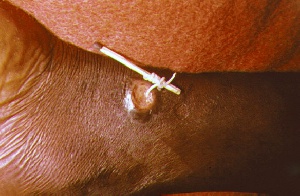Health News of Saturday, 19 January 2013
Source: GNA
Jimmy Carter’s Guinea Worm Eradication Campaign reaches final stages
The International Guinea Worm Eradication Campaign spearheaded by The Carter Centre has reached its final stages with only 542 cases reported worldwide in 2012.
These provisional case numbers, which were identified by ministries of health in the remaining four endemic nations and compiled by The Carter Center, showed that cases of the parasitic disease were reduced by nearly half in 2012.
“Having only 542 Guinea worm cases worldwide in 2012 is a testament to the hard work of the endemic and formerly endemic communities, supported by The Carter Center and our partners,” Former U.S. President Jimmy Carter and founder of the Carter Centre said in a statement issued by the Centre and copied to the Ghana News Agency.
The former US President, who has been personally committed to the campaign for nearly three decades, explained that the collateral impact of the campaign had been immense and had empowered people in some of the world’s most neglected communities to protect themselves from a terrible disease and to believe in the possibility of a brighter future.
The statement explained that there were 3.5 million cases of Guinea worm in 21 countries in Africa and Asia when The Carter Center began leading the international campaign in 1986 and these cases have been reduced by more than 99.999 per cent.
The Centre’s success in leading the battle against Guinea worm disease is in the vanguard of a new worldwide push to combat neglected tropical diseases (NTDs).
For more than a quarter century, The Carter Center had remained on the forefront of NTD eradication and elimination.
To reaffirm its commitment, the Centre was one of more than 60 signatories to the January 2012 London Declaration, a multi-organizational pledge to eliminate or control 10 diseases worldwide by 2020. Guinea worm eradication is poised to succeed in the next few years.
In 2012, South Sudan reported the majority of cases (521) from a handful of isolated locations. The remaining cases in 2012 were reported by Chad (10), Mali (7), and Ethiopia (4).
According to projections from the Centre for Global Development, the campaign had averted more than 80 million cases worldwide since 1986. President Carter announced the provisional numbers during a virtual press conference earlier this morning.
“In any eradication effort, the final few cases are always the hardest and most expensive to wipe out, but we cannot stop until the job is done. If we leave even one case behind, this terrible disease can return to inflict immense suffering on some of the world’s most neglected people and communities,” Dr. Donald R. Hopkins, Carter Centre Vice President of Health Programs, added.
Guinea worm disease afflicts the world's poorest and most isolated communities. Also known as dracunculiasis, Guinea worm disease is contracted when people consume water contaminated with Guinea worm larvae.
After a year, a meter-long worm slowly emerges from the body through a painful blister in the skin. The ancient disease is being wiped out through health education and behavior change, such as teaching people to filter all drinking water and keeping anyone with an emerging worm from entering water sources.
There are no vaccines or medicines to prevent or treat the disease, but thanks to the tenacity of thousands of health workers involved in the international campaign, Guinea worm is poised to be the second human disease eradicated after smallpox.
The statement acknowledges the many generous foundations, corporations, governments, and individuals have made the Carter Centre’s work to eradicate Guinea worm disease possible, including major support through 2015 from the Bill & Melinda Gates Foundation, United Kingdom’s Department for International Development (DFID).
Others were Children’s Investment Fund Foundation (CIFF), and His Highness General Sheikh Mohamed bin Zayed Al Nahyan, Crown Prince of Abu Dhabi, in the name of His Highness Sheikh Khalifa bin Zayed, President of the United Arab Emirates (UAE).
Key implementing partners included the ministries of health in endemic countries, World Health Organization (WHO), UNICEF, and the U.S. Centers for Disease Control and Prevention (CDC).











